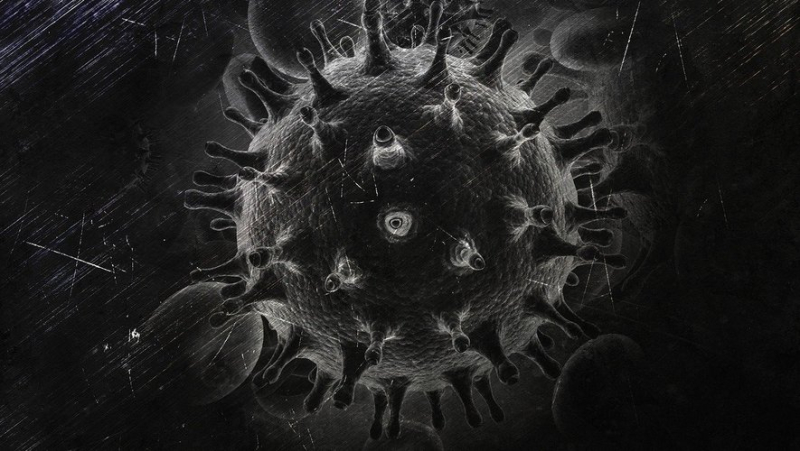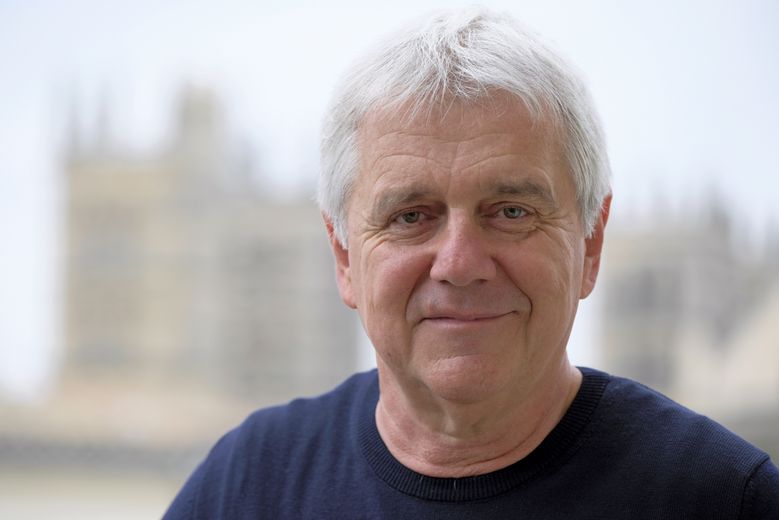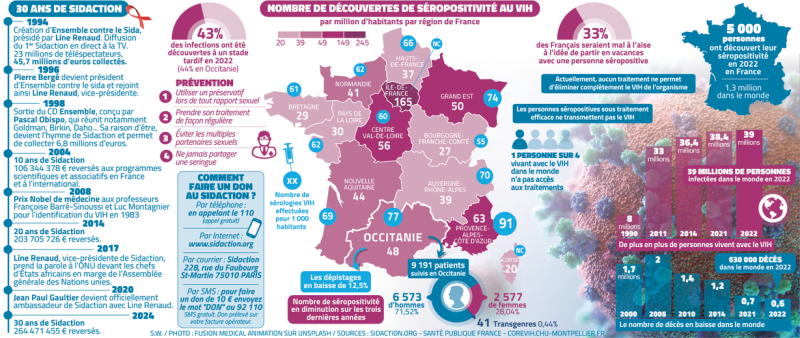“Without Sidaction, associations and research would not exist,” recalls Franck Marcé, from Sida Info Service Occitanie

The AIDS virus. PIXABAY/MADARTZGRAPHICS
"For thirty years, in the face of HIV, we have not stopped" : this is the theme of the 2024 edition of Sidaction, on 22, 23 and March 24, three days of awareness raising and fundraising among the general public to support research and patient associations. Today, 5,000 new cases are discovered each year in France, nearly a third of which are at an advanced stage. For Franck Marcé, regional coordinator of Sida Info Service, we must remain mobilized.
Research, prevention, support… Franck Marcé, coordinator of Sida Info Service in Occitanie, recalls that Sidaction is one of the key moments in the mobilization against HIV. Mylène Farmer is the voice of the Sidaction campaign spot, with music by Woodkid. To make a donation, you must call 110.
Depuis 30 ans, face au VIH, on n’a pas arrêté de s’aimer, de pleurer, de chercher, de demander, de progresser… Aujourd’hui, nous n’avons pas le droit d’arrêter.
Continuons le combat. Faites un don. #Sidaction2024
Merci ❤️ à #MyleneFarmer pour la 🎙️ et @Woodkid pour la 🎶 pic.twitter.com/7YiR3nFrhM
— Sidaction (@Sidaction) March 18, 2024
Nearly a third of patients infected with HIV arrive at the hospital with a late stage of the disease, according to a study presented on last March 14 by the National Agency for Research on AIDS and Viral Hepatitis, how are we here today?
We are facing several epidemics: an active epidemic, of people who are contaminating themselves and exposing themselves at the moment and who, fortunately, are being detected relatively quickly; a slightly older epidemic, among people whose immune defenses have already declined, who have been contaminated for four, five, six years but who have not had the opportunity to take a test ;; and a proportion of people who arrive at the diagnosis very late, either because they do not feel concerned by the HIV test, or because they are still so afraid of this diagnosis that they do not take the HIV test. rsquo;don’t dare to confront it.

Franck Marcé is regional president of Sida Info Service. Free Midi – GIACOMO ITALIANO
Fear of a pathology that continues to frighten, and fear of the social consequences of discovering HIV status, in relation to their partner, and possibly their life as a couple.
There you go, we have several profiles and obviously it’s very complicated to seek out people who, for a whole bunch of good or bad reasons, want to avoid confronting them .
It’is consistent with regard to the epidemic, but it’s extremely complicated to curb. Fortunately, we cannot force people to take tests against their will. Perhaps we should take advantage of opportunities, perhaps systematically offer screening in emergency rooms…
Last point: in these situations we probably have people from endemic areas, who in their migratory journey have factors of exclusion and vulnerability which do not favor access to care .
But it is a crucial point to control the epidemic.
You last mentioned the problem of migrants, it’s a mistake to focus on this population when we talk about this difficulty in screening, and treating very quickly& nbsp;?
This is one of the factors, it is not the main factor, and it is very far from being the main factor in Occitania, particularly in the region. rsquo;east of the region. We are not a region of high migration of African origin.
Yes, this is a public at risk. But it’s always complicated to do prevention without being stigmatizing. And we must remember that this is not an imported epidemic: these people do not come to France for treatment, they are fleeing poverty, war, discrimination… hellip; and it is often during their migratory journey that they are contaminated because their precariousness allows them little access to prevention.
Without targeting the public either, do young people protect themselves less or is this a preconceived idea ?
No less than other audiences. But the probability of having an HIV partner is lower in certain populations than in others.
Sidaction also serves this purpose: we must both make a general prevention effort, and then make targeted prevention efforts and access to screening for groups particularly exposed to the risk of contracting HIV.
The last point in terms of prevention is that we clearly see, at the European level, that there is today an upsurge in sexually transmitted infections which will require mobilization: we see Chlamydia in young women, gonorrhea more in young heterosexual men, syphilis more in gay prostitutes, but not only… hellip; We must encourage regular screening.
Prevention is not “I took a risk, I’m taking a test”, it’s “I have an active sex life with multiple partners, so at least once a year, I go through the screening box. The doctors call it jokingly but I think the image is good the "technical inspection". Most STIs are very curable.

The main stages in the fight against AIDS. SOPHIE WAUQUIER
"We must deconstruct sometimes exaggerated fears"
There is, still, a general lack of knowledge about what HIV is; according to an Ifop survey for Sidaction, a third of French people ’would be uncomfortable with the idea of going on vacation with an HIV-positive person" a quarter of people are embarrassed to "work with someone living with HIV"… This is also the case for prevention?
Communication on prevention, whatever the subjects, is complicated. We put terrible messages on cigarette packets and people continued to buy them.
We are working on a notion of overall sexual health, a consensual, fulfilling sexuality, with an awareness of the risks linked to sexual practices.
We must deconstruct sometimes exaggerated fears, but people must be aware that there are risks. For populations very exposed to HIV risk, the issue is so-called biomedical prevention, that is PrEP, pre-exposure prophylaxis which works extraordinarily well when taken correctly.
It’is a Sisyphean job, prevention, and even more so on issues that touch on intimacy.
What is the Sidaction ?
for?
This is one of the key moments in the mobilization against HIV. It is first of all a media focus on the epidemic in France, which remains a reality. It is also an opportunity to find essential means both to finance targeted prevention and support for people living with HIV, and to finance research.
Sidaction does not fund huge research programs. It will instead finance positions for young researchers who can be mobilized against HIV. We have an excellent example in Montpellier with the Institute of Molecular Genetics, where doctoral students work in an extremely sophisticated manner on the mechanisms of replication and control of HIV at the cellular level.
Understanding these mechanisms could open up new therapeutic avenues for controlling HIV. Without that, there is no progress possible. We must explore new avenues, find new flaws in the HIV armor that pharmaceutical laboratories will be able to exploit tomorrow.
The world day of December 1 was an opportunity to discuss great progress on the subject, beyond the few cases of healing .
There is indeed a lot going on, both in areas of preventive vaccination and curative vaccination as well. Curing HIV is going to be complicated in the years to come. But achieving virological control using new approaches will be major progress.
There are also great advances in treatments that doctors call "long acting", with prolonged action, giving the possibility of being treated against infection by injections every two or three months, or tablets once a week.
"We are not safe from a resurgence of the epidemic"
Is there still as much mobilization for Sidaction ?
It’s more complicated because people think that it’s settled, that it’s a rearguard fight. Aids is 30 years old, the discovery of HIV was 40 years ago, other more direct threats worry people. It's not about making people anxious but about saying that things can be controlled, through prevention via a condom or PrEP, through diagnosis as early as possible…hellip;
The epidemic which is not completely under control, we still have alerts. In Canada, Montreal has noticed that the number of new diagnoses has exploded… We are not safe from a resurgence of the epidemic.
Research, as on rare diseases with the Telethon, is used for other pathologies?
Quite. The latest avenues of research intersect a lot with the latest therapeutic strategies concerning cancer. The best strategy to fight an infection is the immune system, we will have to find these treatments which will "boost" the person’s immunity so that they can get rid of a tumor or control an HIV infection.
It’s stimulating to say that there are new perspectives. We must therefore continue to mobilize.
Without Sidaction, associations that do essential field work, like Envie in Montpellier, would not function in the same way ?
Without Sidaction, Envie would no longer exist, that’s very clear. And without Sidaction, it is likely that young "HIV" of the IGMM would work on nutrition or other pathologies, but not on HIV.
I subscribe to read more




